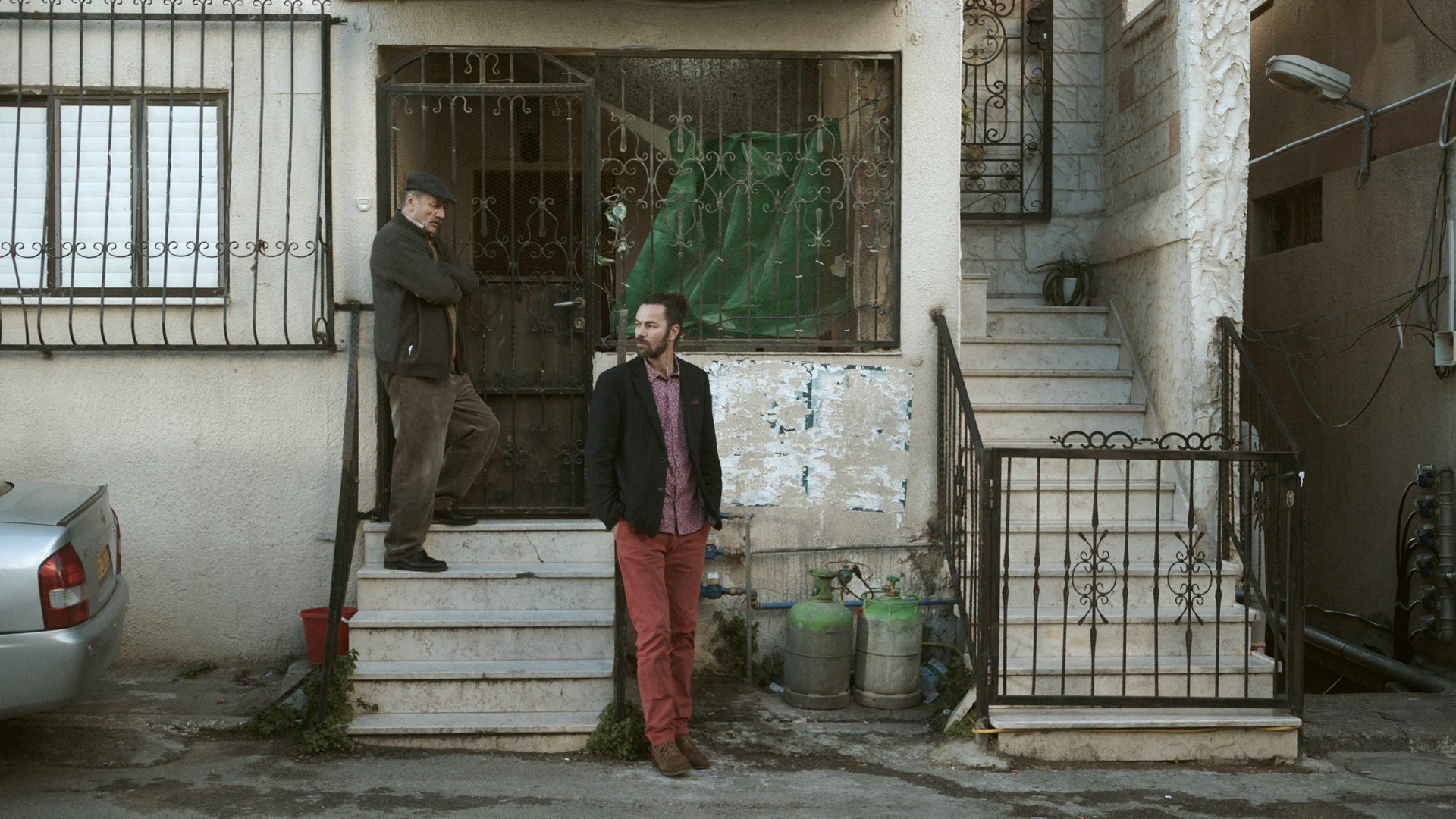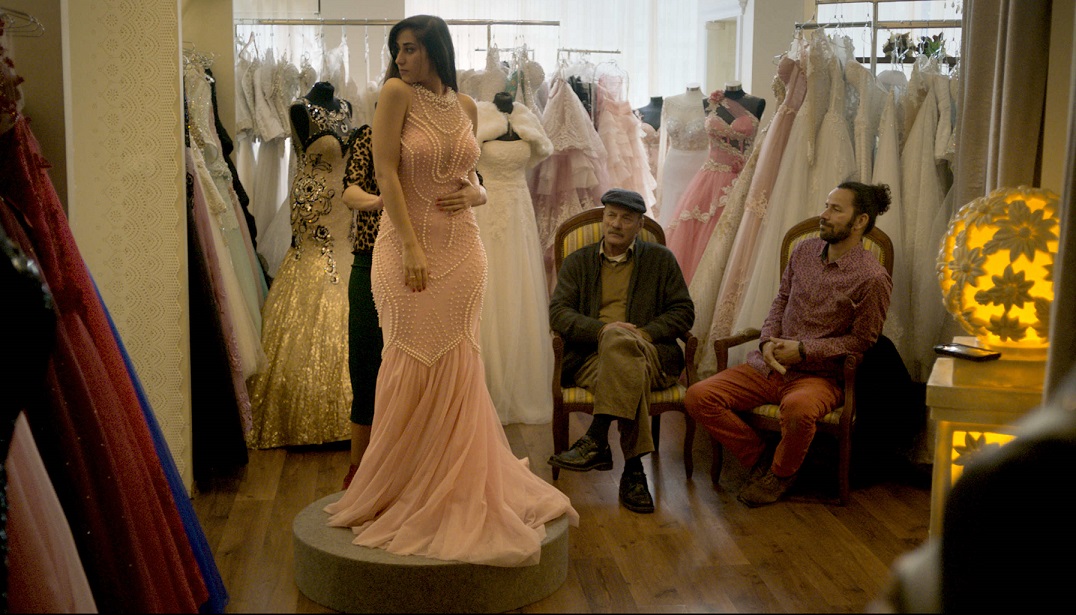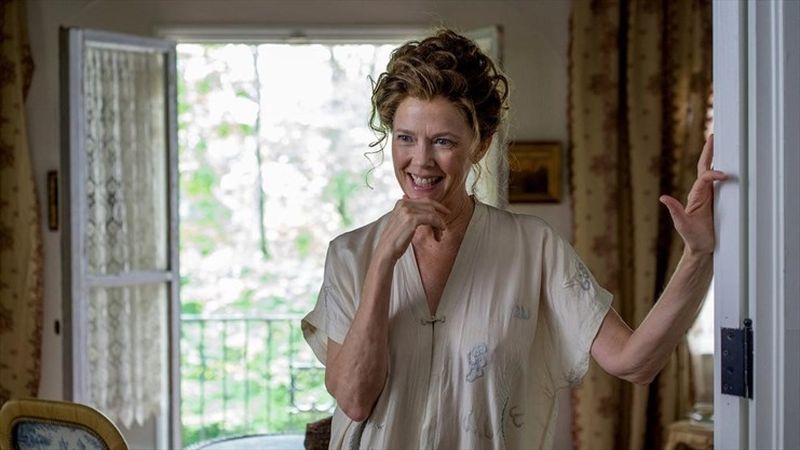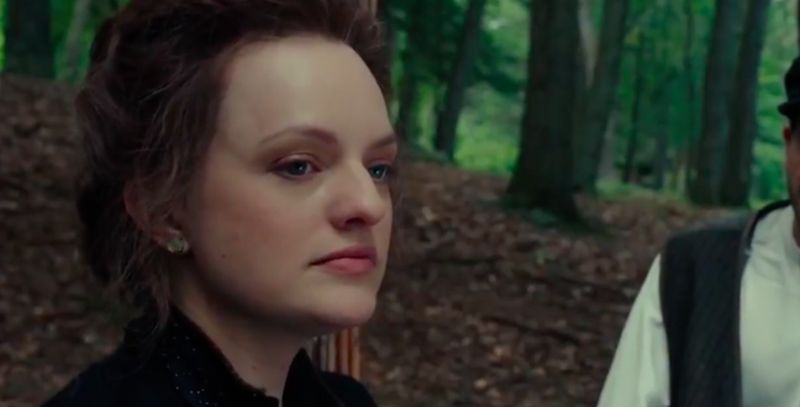Wajib review - poignant, profound humanism
Annemarie Jacir’s father-and-son drama speaks widely of its Palestinian world
Annemarie Jacir’s third feature may have picked up a subtitle, “The Wedding Invitation”, for international distribution, but the key to her intimate portrait of Palestinian life seen through a father-son relationship lies in understanding the full nuance of its title. The word wajib, best translated from Arabic as “social duty”, is spoken only once in the film – an invitation is taken to an old lady whom the hosts know will be unable to attend, but they offer it because that is the accepted, the proper way in their society – but its concept pervades the entire film.
Jacir has located her story within the Palestinian Christian community in the Israeli city of Nazareth, where the tradition remains strong that the father of the bride must hand-deliver wedding invitations to family and friends, and that it’s the duty of his son to accompany him. Even though this is a community that is as geographically contained as it is closely bonded, it’s a task that can take days – not least because every stop brings an almost ritualistic invitation to drink coffee, another aspect of tradition that cannot be disregarded. That may sound like a perfect opportunity for some père-et-fils quality time between sixty-something Abu Shadi and his man-bunned son, Shadi (Mohammad Bakri and Saleh Bakri, father and son in real life, pictured above), but in reality the sturdy old Volvo they are driving sometimes appears more resilient than their relationship. Jacir’s beautifully observed script skilfully outlines their wider circumstances and family story, taking in both the very particular realities of their life as Palestinians in a particular environment, as well as the general hazards and frictions of family life that might be found anywhere in the world.
That may sound like a perfect opportunity for some père-et-fils quality time between sixty-something Abu Shadi and his man-bunned son, Shadi (Mohammad Bakri and Saleh Bakri, father and son in real life, pictured above), but in reality the sturdy old Volvo they are driving sometimes appears more resilient than their relationship. Jacir’s beautifully observed script skilfully outlines their wider circumstances and family story, taking in both the very particular realities of their life as Palestinians in a particular environment, as well as the general hazards and frictions of family life that might be found anywhere in the world.
The difference between home and abroad is one central division between them. Shadi was sent abroad to study by his father, and has settled in Italy, where he works as an architect. The reasons for that earlier departure become clearer as the film proceeds, involving the general question of Abu Shadi’s necessary accommodation with the Jewish authorities – “I have to deal with them!”, he explains with the exasperation of the pragmatist – and is crystallised into one particular issue that gives rise to a strong late scene of angry conflict. That Shadi’s girlfriend is the daughter of an exiled PLO high-up only accentuates the distinction, emphasising the restricted reality of occupation against the broader perspectives of the diaspora. It doesn’t help that the younger man is forthright with his criticism of conditions in his erstwhile hometown, directed at everything from its street rubbish and neglect of architecture to the “closed minds" of its people.
The father can certainly be an awkward cuss on occasions, but has a humour that wins us over
The fact that his son has anchored his emotional life abroad clearly saddens his father, who would like nothing better than to marry him off to a local girl. He drops hints to that effect at almost every stop, lamenting that “It's too bad people don't marry their cousins anymore” when a family lunch introduces an independent female relative into the company. The older man’s sensitivity to the issue of marriage is no abstract matter, however: it gradually becomes clear that he himself is separated from his wife, who now lives with another man in New York, her return to the wedding proving complex in every sense. He had been left to look after their two children on his own, a blow that hit hard not only for personal reasons but because it broke with values and tradition, prioritising personal freedom over the kind of obligation that is there in the film’s title.
Bakri senior plays this with a wounded dignity that hits home, his face revealing more through craggy restraint than anything more obvious. He can certainly be an awkward cuss on occasions, but has a humour that wins us over, especially when set against the peremptory remoteness of his son: the experience of age, even when it has had to admit compromise, wins out over the intolerance of youth. “The most beautiful bride!” he exclaims simply to his daughter as she tries on wedding dresses (pictured below), his words spoken with such rich pride that they resound long after we forget all the younger man’s frustrations and anger. Wajib is a film anchored to its very depths in a particular territory, with Jacir giving us all the particular details of life of her chosen world – its everyday aspects but also a sense of its past, of roots that extend further back than any current politics. The director was born in Bethlehem and, after growing up in Saudi Arabia, education in New York, and some years based in Amman, has now returned to live there: we may wonder whether the profound humanism of her new film somehow reflects that relocation. It’s there in the film’s look, too: there’s little obvious beauty in the Nazareth locations, but they’re caught with real resonance, as well as poised framing by French cinematographer Antoine Héberlé (perhaps an outsider’s eye helps).
Wajib is a film anchored to its very depths in a particular territory, with Jacir giving us all the particular details of life of her chosen world – its everyday aspects but also a sense of its past, of roots that extend further back than any current politics. The director was born in Bethlehem and, after growing up in Saudi Arabia, education in New York, and some years based in Amman, has now returned to live there: we may wonder whether the profound humanism of her new film somehow reflects that relocation. It’s there in the film’s look, too: there’s little obvious beauty in the Nazareth locations, but they’re caught with real resonance, as well as poised framing by French cinematographer Antoine Héberlé (perhaps an outsider’s eye helps).
Jacir’s previous film, When I Saw You from 2012, overlapped a personal story with the wider circumstances of the history of her people. Wajib may appear to have narrowed its horizons, but in burrowing down to the essentials, allowing detail to speak volumes, she proves, resoundingly, that less can be far, far more.
Overleaf: watch the preview for Wajib
An Adventure, Bush Theatre review - epic but flawed
Deeply felt show about love, marriage and migration doesn’t quite work
Director Madani Younis, who since 2011 has transformed the Bush Theatre in West London into one of London's most outstanding Off-West End venues, is leaving in December, on his way to becoming the creative director of the Southbank Centre.
The Seagull review - Chekhov classic gets the all-star treatment
Annette Bening unleashes her inner diva as the latest screen Arkadina
A starry and mostly American cast does well by The Seagull, Chekhov's eternally moving portrait of egomania run wild and self-abasement turned tragically inward. Combining two major players from the New York theatre world in director Michael Mayer (London's Funny Girl, Broadway's Hedwig and the Angry Inch) with a Tony-winning adapter in The Humans' Stephen Karam, the film suffers only from an occasional literalmindedness that exists at odds with the multi-layered nuance of the source material. Still, Annette Bening in full flow is always worth one's attention, and a distinguished supporting cast for the most part matches her a large part of the way.
Karam's Broadway treatment of The Cherry Orchard (with Diane Lane in the lead) was fairly savagely dispatched last autumn, and his Seagull has similarly come in for some hard knocks that, to this observer at least, aren't altogether deserved. True to the emotional geometry of the play if sometimes inclined to underscore it too intently, this Seagull captures the cat's cradle of crossed affections that animates Chekhov's merciless portrait of vanity and ego and of a mother (Bening's Arkadina) who surely loves her son (Billy Howle's impressive Konstantin) even as she can't help wreaking havoc with both his professional and personal aspirations.  This version provides a prologue for Arkadina that find this vainglorious actress in her natural theatrical habitat, before the narrative of the play itself kicks in with the return to her brother Sorin's rural estate of Arkadina and her retinue, which includes the spineless if charismatic Trigorin. (In that crucial and difficult role, New York theatre regular Corey Stoll manages to be both imposing and weak, as required by the dictates of a plot that spans several years on the way to its tragic finish.) And whether revelling in the applause of her unseen audience or interrupting her son's play to proffer a deflating aspersion or two, Bening (pictured above) is in full command of the ever-mercurial Arkadina, a part this terrific actress should at some point revisit onstage; while we're at it, she'd be an excellent Ranevskaya, as well.
This version provides a prologue for Arkadina that find this vainglorious actress in her natural theatrical habitat, before the narrative of the play itself kicks in with the return to her brother Sorin's rural estate of Arkadina and her retinue, which includes the spineless if charismatic Trigorin. (In that crucial and difficult role, New York theatre regular Corey Stoll manages to be both imposing and weak, as required by the dictates of a plot that spans several years on the way to its tragic finish.) And whether revelling in the applause of her unseen audience or interrupting her son's play to proffer a deflating aspersion or two, Bening (pictured above) is in full command of the ever-mercurial Arkadina, a part this terrific actress should at some point revisit onstage; while we're at it, she'd be an excellent Ranevskaya, as well.
Funny and spiky (Bening gets a laugh proffering a nominal tip to the household help which, she announces, is to be shared three ways), her Arkadina captures better than most this mother's belated awareness of the the full damage being wrought on a hyper-sensitive son whom she both cossets and destroys. You feel at once her essential blindness to the reality of the scenario unfolding around her, alongside a slow-aborning realisation that her recklessness has consequences, for sure. Stoll's Trigorin, by contrast, knows that he is one of life's destroyers but carries on regardless, his psychic evisceration of Konstantin's beloved Nina (Saoirse Ronan) running in tandem with the imploding artistic despair of the young writer, Konstantin, doomed to exist on life's margins.
 A name-heavy cast (a pragmatic Jon Tenney here, a tearful Mare Winningham there) includes Elisabeth Moss (pictured right) in terrific form as the mordantly funny, black-clad Masha, trapped in a marriage that roils her to the soul, and Brian Dennehy as the ailing Sorin, who at least is allowed to expire in something resembling the natural order of events: a luxury not always available to the younger generation around him. Amongst that blighted lot, I expected rather more from Ronan's Nina, the self-described seagull of the title, who seems hampered by an American accent that never sounds as lived-in as the one this three-time Oscar nominee assumed so well for Lady Bird. That said, this Seagull compels and wounds as it must and ends with the requisite moment of hinted-at recognition as Arkadina and co get on with life, even as they exist forever to be shadowed by death.
A name-heavy cast (a pragmatic Jon Tenney here, a tearful Mare Winningham there) includes Elisabeth Moss (pictured right) in terrific form as the mordantly funny, black-clad Masha, trapped in a marriage that roils her to the soul, and Brian Dennehy as the ailing Sorin, who at least is allowed to expire in something resembling the natural order of events: a luxury not always available to the younger generation around him. Amongst that blighted lot, I expected rather more from Ronan's Nina, the self-described seagull of the title, who seems hampered by an American accent that never sounds as lived-in as the one this three-time Oscar nominee assumed so well for Lady Bird. That said, this Seagull compels and wounds as it must and ends with the requisite moment of hinted-at recognition as Arkadina and co get on with life, even as they exist forever to be shadowed by death.
Overleaf: watch the preview for The Seagull
The Humans, Hampstead Theatre review - a riveting family portrait
Stephen Karam uses domestic drama to tell a contemporary American horror story
Transatlantic theatrical traffic is busier than ever, and now here at the Hampstead is not just Stephen Karam’s Tony-winning play, first seen in 2015, but director Joe Mantello and his full Broadway cast.
Wanderlust, BBC One review - an unflinching look at stale sex
A strong cast and well-crafted script offer a new take on marital infidelity
What signals the end of a relationship? The loss of attraction? Infidelity? Or is it, as Wanderlust explores, something more innocuous? The opening episode of BBC One's latest show packed in enough domestic drama to sustain most series, but found its pressure points in unexpected places.
Cold War review - a gorgeous and mesmerising romance
Pawel Pawlikowski honours the spirit of his parents' turbulent romance
Can we ever really know the passion that brought our parents together? By the time we are old enough to hear the story of how they first met, that lovers’ narrative has frayed in the telling and faded in the daily light of domestic familiarity.
The Guardians review - beautifully crafted drama
French release offers an artful look at farming during World War One
A slow tracking shot over the gassed corpses of soldiers, their masks having failed the ecstasy of fumbling, opens The Guardians. This French art house film would perhaps have been better served by the English title The Caretakers; it's closer to the original French meaning and would have made it less likely to be confused with a superhero movie.
Aristocrats, Donmar Warehouse review - fresh but uneven
Anti-naturalistic revival of Brian Friel's elegiac tribute to the Catholic nobility is oddly unemotional
Chekhovian is a rather over-used word when it comes to describing some of the late Brian Friel's best work, but you can see why it might apply to Aristocrats, his 1979 play which premiered at the Abbey Theatre in Dublin before becoming a contemporary classic. You can count off the elements that remind you of the Russia master: decaying estates, feckless toffs, wistful longings and missed opportunities.
Annie Ernaux: The Years, review - time’s flow
Magisterial and unconventional account of 1941 - 2006 from France’s premiere memoirist
“When you were our age, how did you imagine your life? What did you hope for?” It is a video of a classroom south-east of the Périphérique separating Paris from the working-class suburbs. The students are mostly girls between fifteen and sixteen and they wear make-up, jewellery, low-cut tops – we understand they’re sexy, confident, cool. Several are African, North African, Caribbean.
